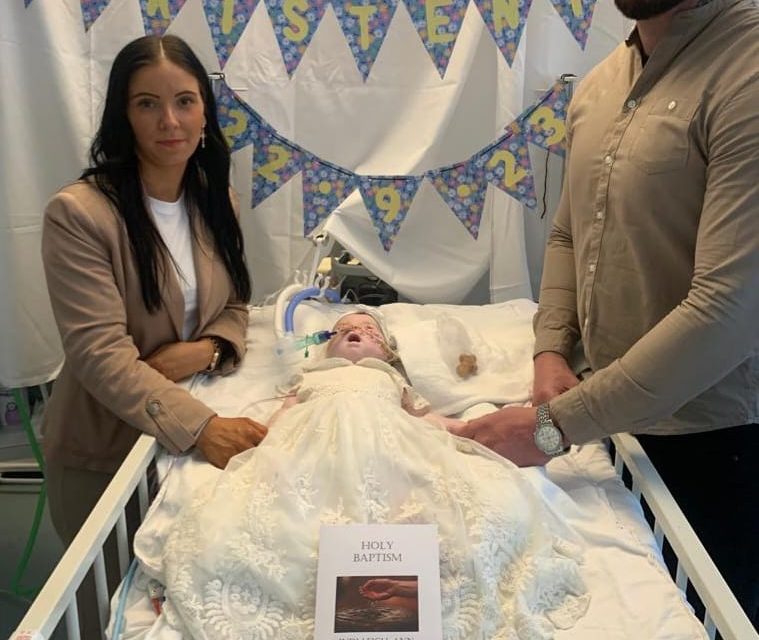Despite her parents fighting a fierce legal battle for her right to live since September, Indi Gregory, an 8-month-old baby girl with mitochondrial disease, died in the early morning of Nov. 13. A British High Court judge had ruled that she be transferred to hospice care, and her life support was removed against her parents’ wishes. Her mother, Claire Staniforth, “held her for her final breaths,” according to her father, Dean Gregory.
“Claire and I are angry, heartbroken, and ashamed,” Gregory remarked in a statement to U.K.-based Christian Concern. “The NHS [National Health Service] and the courts not only took away her chance to live a longer life, but they also took away Indi’s dignity to pass away in the family home where she belonged.”

Indi’s parents received a glimmer of hope on Nov. 6 when the Italian government offered the infant specialized treatment in the Bambino Gesù Paediatric Hospital in Rome, where specialists hoped to carry out a right ventricular outflow tract stent procedure that had been suggested by medical experts. The Italian government even granted Indi emergency citizenship to support her move to Rome.
However, the U.K. High Court judges ruled that Italy’s intervention was “misconceived”—and that it would be in Indi’s best interest if her life support were removed immediately. With their child’s move to Rome blocked by the court, Indi’s parents attempted to appeal to have her life support removed in their family home as opposed to hospice or the hospital, but the court refused.
Indi was taken in an ambulance and escorted to hospice by security, sleeping through the journey, according to Christian Concern. Her life support was removed; she stopped breathing once, then recovered, “fighting hard,” her father said. She passed away at 1:45 a.m. on Monday morning.
Indi was born in February and diagnosed in June with mitochondrial disease—a rare and currently incurable disease affecting energy production in the body’s cells. She also had a hole in her heart and underwent operations to remove fluid from her bowel and skull. She had been in pediatric intensive care at the Queen’s Medical Centre in Nottingham since her birth.
In September, the Nottingham University Hospitals NHS Trust began requesting to remove invasive treatments from the child, claiming it was not in her best interest to continue. This eventually led to a request to remove critical care, according to the doctors’ belief that it would be kinder to let Indi die than to continue to treat her in her condition.
Indi’s parents disagreed, claiming that their baby’s condition was misrepresented and that she was responsive to her family. “Our daughter responds to us,” her father said, “and on her good days she is babbling, making noises, moving all her limbs.” Despite the ensuing legal battle and new treatment options offered in Italy, the Trust and the British High Court would not budge on their decision to let Indi die.
Indi’s case is reminiscent of Charlie Gard, a baby boy who suffered from mitochondrial disease and died in 2017 at 11 months old. With worldwide support and sympathy, Charlie’s parents raised funds to take him to the U.S. to receive a 3-month trial of medication. The hospital and British courts barred their way to the U.S., and he died in hospice.
“Life is the most precious gift we have,” said Andrea Williams, chief executive of the Christian Legal Centre, who pushed for reform of the U.K. health care system in the midst of Indi’s case. “We need families to be free to appoint alternative doctors and medical experts with equal access to the patient’s records. We need proper mediation at the earliest stage rather than parents being dragged into unfamiliar court settings and facing down taxpayer-funded legal teams.”
“They did succeed in taking Indi’s body and dignity, but they can never take her soul,” Gregory said. “They tried to get rid of Indi without anybody knowing, but we made sure she would be remembered forever. I knew she was special from the day she was born.”
Photo: Christian Concern
